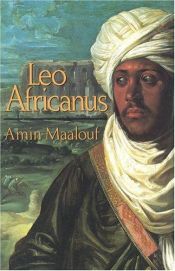De geograaf van de paus Leo Africanus
Blurb
Leo Africanus is a 1986 novel written in French by Amin Maalouf, depicting the life of a historical Renaissance-era traveler, Leo Africanus. Since very little is actually known about his life, the book fills in the historical episodes, placing Leo in the company of many of the key historical figures of his time, including three popes, two Ottoman emperors, with appearances by Boabdil, Askia Mohammad I of the Songhai Empire, Ferdinand of Spain, and Francis I of France, as well as the artist Raphael and other key political and cultural figures of the period.Leo Africanus is Maalouf's first novel. It received high praise. It is written in the form of a memoir.

 English
English Español
Español Deutsch
Deutsch










Member Reviews Write your own review
Endovelico
Leo, Africanus is without a doubt a riveting, epic tale based on the life of a traveler, diplomat, merchant, slave, scholar, etc; whose life would have made a movie, every critic would deride as self-indulgent, irreal and plainly just way over the top. It is in fact an amazing life, who leaves you vicariously humbled as you find more about it. The book is sectioned in 'Years' which are basicaly chapters spanning roughly a years period (Arab calendar is used). Although this is a nice touch, the fact of the matter is that in trying to keep the chapters equitative in lenght the book gives off the impression that some chapters are rushed due to the nature of the events going in years of historical significance, while in other chapters/years it feels dragging. The reading also feels, at times, slightly disjointed since the point of view doesn't center it self on Leo until he reaches a certain age where his thoughts and conscience are of a certain maturity and worth sharing. This was of course intentional and a necessary evil (if you can call it that) but i do feel it detracts a bit, eventhough the narrative mantains solid throughout. The book does a fantastic job of describing how Leo might have lived and does paint a layered emotional and psychological portrait of him, but historically it's not until the third part of the book that you feel immersed in the historical period rather than just Leo. Up until the mentioned part of the book, you don't really 'feel' the cultural and historical ambiance (Which is a must for me in Historical fiction works), eventhough there is definitely a reasonably thourough description of how the different cultures lived. For this, and for having read Samarkand before this book, Leo, Africanus pales in comparison by upping the pace a bit too late. Still this book will not fail at managing to immerse, educate and entertain you.
Be the first person to review